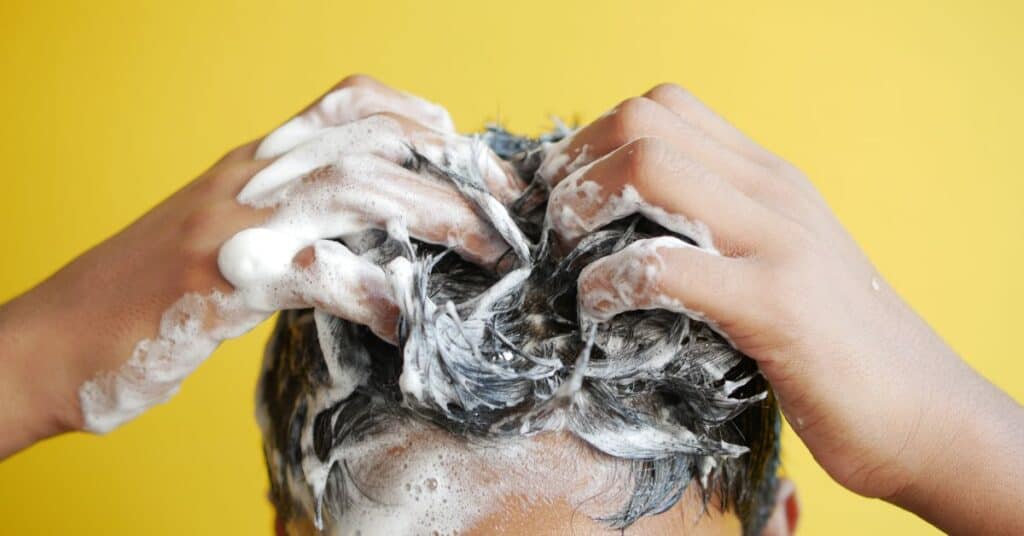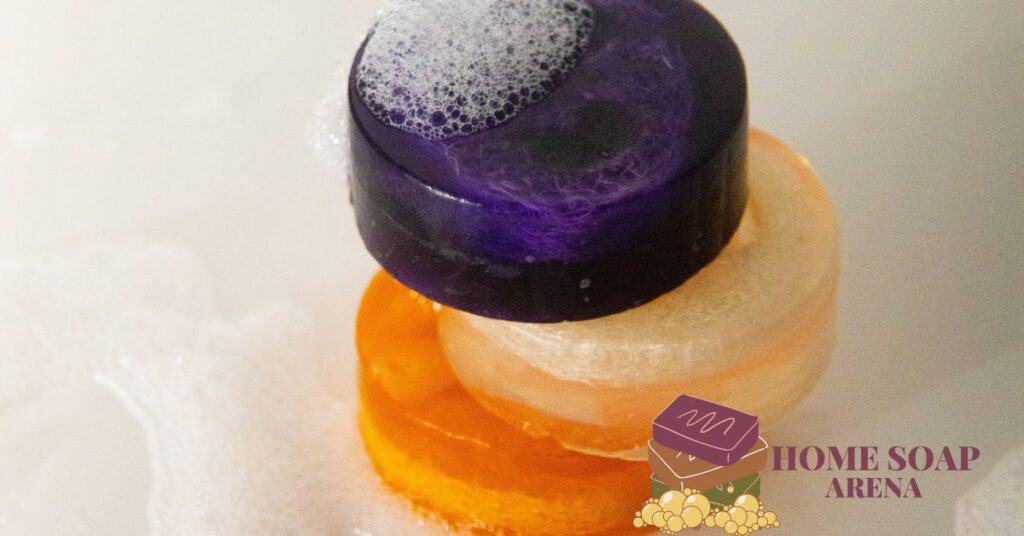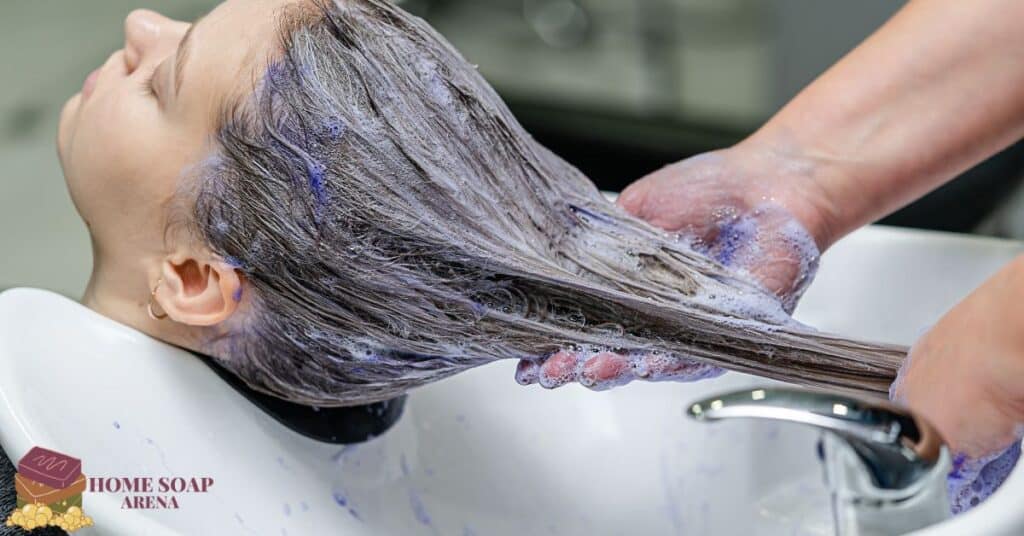Table of Contents
- What Causes Hair Loss?
- What Is Soap And How Does It Affect Hair?
- What Are The Soap Bars That Cause Hair Loss?
- How To Prevent or Reverse Hair Loss?
- Conclusion
Can washing hair with soap bars cause hair loss? Yes! That is what I will show you in this article.
A shampoo is a cleaning agent that ‘does not leave a soap residue’; however, soap does leave a residue, which means that soap is not a shampoo.
It is critical to understand that soap bars are designed with various purposes, ingredients, and functions in mind.
As a soap maker with years of experience in soap-making for skin and shampoo bars for hair, I understand there is a difference between a soap bar and a shampoo bar.
The term “shampoo” is derived from the Hindi word “champoo,” which means “to press or massage” hair while cleaning.
Since the introduction of shampoo to the market in the 1930s, we have avoided using ‘soap’ bars to clean our hair for the past 90 years..
In this blog post, I will show you soap that makes hair fall and variables to consider regarding hair loss.
Let’s start!
What Causes Hair Loss?
First, hair loss is natural but becomes abnormal when it is a consistent cycle in large volume.
There are many possible causes of hair loss, but the most common is androgenic alopecia, a hereditary condition affecting both males and females.
Androgenic alopecia causes gradual hair thinning on the scalp, especially on the top of the head or along the hairline.
Other causes of hair loss include hormonal changes, medical conditions, medications, stress, infections, and certain hairstyles or treatments.
The hair growth cycle has three phases:
The anagen (growth) phase, which can last for years
The catagen phase lasts for about ten days and occurs when hair stops growing and separates from the follicle.
The telogen (resting) phase of two to three months, after the hair falls out
Telogen effluvium occurs when large numbers of hair follicles push into the resting phase.
On average, we lose 50 – 100 hairs from our heads every day – mostly during washing and brushing.
So, you can expect to lose a bit more on the days you wash your hair if you don’t wash your hair every day.
This is why it is not recommended to wash your hair daily; at least 2 to 3 times a week is enough.
Hair loss can be temporary or permanent, depending on the cause and the treatment options.
What Is Soap And How Does It Affect Hair?
Soap is a product that cleanses the skin or hair by removing dirt, oil, and bacteria.
Soap can be made of natural or synthetic ingredients and come in different forms, such as bars, liquids, gels, or powders.
Soap has different effects on the hair. Soap bars can make hair fall out by drying the scalp, stripping the natural oils, or causing allergic reactions.
Soap bars are acceptable for the skin because the body has an acid mantle that replenishes itself after you shower, but this is not the case for your hair.
Seeing that we have different hair types, you must pay attention and research the products you use on your hair. And stick to what suits your hair.
Alkaline products are damaging to the hair. And the definition of a shampoo bar is a bar that doesn’t leave residue on your hair. So, soap bars are technically not shampoo.
So, even if you use a soap bar and vinegar afterward, that will not remove the problems with using an alkaline product on your hair. And the damage it is going to cause
Certain soap bars are drying to the skin and should not be used on the hair.
Plus, it is vital to note that hair care is personal because we have varying hair types.
Soap bars cause hair loss because they contain harsh chemicals or allergens that irritate or damage the scalp and hair follicles.
For example, too alkaline soap can raise the scalp’s pH, disrupting the natural balance of the skin and hair.
This makes the hair more brittle, prone to breakage, and susceptible to damage.
A highly concentrated soap or soap not rinsed out properly can leave residues on the scalp and hair, clogging the pores, weighing down the hair, and, as a result, reducing its shine and volume.
Soap bars don’t allow the cuticle to lay flat and can leave a residue, especially in hot water areas with high pH, causing dull-looking hair.
As a result, this sort of soap-making is still a very alkaline product (pH 9-11), and scientific research has shown that this causes issues for our hair.
The outer layer of cuticle cells will not lay flat, and the cells then catch on each other, causing friction, knots, and tangles when alkaline products are used.
In some cases, it can lead to the permanent ripping of scales, leaving the inner cortex open to potentially more damage.
Over time, this will start to affect the overall health of the hair as the conditioning ingredients (that are positively charged and naturally attracted to these fatty lipids) can’t ‘adsorb’ to them and offer the properties that give our hair that conditioned look, feel, and shine.
This protective lipid layer has another negative effect: the hair becomes more water-loving (hydrophilic).
This happens when the hair has been damaged, leading to more water entering and swelling the hair shaft, lifting the cuticle cells and resulting in even more friction and damage.
In contact with water, soap bars leave an alkaline residue harmful to the hair in the form of calcium salts, which accumulate in the hair strands, leaving them tangled.
This soap ‘scum’ can also cause itching, exacerbate redness, scaly patches, and dandruff (seborrheic dermatitis) and leave the hair dull.
Also, suppose hair becomes very alkaline and porous.
In that case, the cuticle cannot retain the color as the cuticle fails to hold the new pigments, and the color will rinse out prematurely, so it is not suitable for colored hair either.
So, if you are one of the unlucky people who believe that “a shampoo bar ruined my hair,” it is possible that it was not a REAL shampoo bar at all.
I am afraid it does occur. There is a difference between a hair bar and a shampoo bar.
Numerous hair bars on the market with questionable origins and ingredients claim to be natural shampoo bars.
But if you examine them closely, you will find they are no more than your average soap bar.
That explains why many of them look so cheap: they have inferior quality and ingredients.
What Are The Soap Bars That Cause Hair Loss?
The problem with soap bars sold as shampoo bars is that they have high pH, particularly cold process bar soap, which is about 9 to 11 pH.
The hair and scalp have a 5 to 6 pH value, which you find in shampoo and conditioners. One of the ways you differentiate a soap bar from a shampoo bar is from the price.
In my experience with bar soaps, it is not a question of soap bars that causes hair loss; instead, it is the long-term effect they have on the hair.
Washing your hair with a soap bar should be a last resort; the soap’s alkalinity will destroy the hair’s natural keratin. As a result, your hair will become dry and brittle.
Instead of using soap bars on your hair, opt for shampoo bars made explicitly for your hair.
If you are washing hair with soap bars, avoid using soap bars that contain harsh chemicals such as sodium lauryl sulfate (SLS), which strip the hair of its natural oils and cause dryness and irritation.
Shampoo bars are safe for your hair; they aren’t diluted with vast amounts of water.
These shampoo bars are made with natural cleansing ingredients like shikakai, reetha, and amla, moisturizing butter, BTMS (highly conditioning ingredient), and cetyl alcohol (a vegetable-derived emollient that in itself adds moisture and boosts any cationic quaternary compound ingredients).
Whatever shampoo bar or hair product you choose, ensure it suits your hair type and addresses your concerns.
How To Prevent or Reverse Hair Loss?
If you suspect that your shampoo is causing your hair to fall out, here are some steps you can take to prevent or reverse the damage:
Minoxidil lotion works
The exact formulation works best prescribed by your dermatologist after assessing your scalp health. Use it for at least three months to start seeing results.
Being a stylist for almost a decade, you do not need to use harsh hair shampoo on your hair.
I’ve observed the hairlines of many individuals, and I spotted that individuals who were using harsh shampoo cleansers had poor hairlines.
So I suggest using mild shampoo only. Also, do a hot oil massage for about 5 minutes twice weekly, enhancing circulation and promoting hair.
Hair gummies are a waste. They are not regulated, and ingredients are not standardized.
Also, the marketing makes it seem like everyone who pops a hair gummy will have great hair, which is untrue. This type of marketing is problematic.
Wash your hair less frequently. Washing your hair too often can strip away the natural oils and proteins that protect and nourish your hair.
Use natural or herbal products, such as rosemary and peppermint oil, saw palmetto, or green tea, which have similar effects.
However, before using any hair growth product, read the instructions and follow the directions carefully.
Stopping hair treatments
It would be best not to do hair treatments like keratin, cysteine, or hair Botox when experiencing hair fall.
It’s better to keep your scalp clean, be gentle with your hair, and maintain heating tools to a minimum.
These treatments can be done once your hair fall is reduced by 70-80%.
Anti-hair fall shampoo
No shampoo can reduce hair fall. The only function of a shampoo is to clean the scalp; that is all it does. It doesn’t contain ingredients that can reduce hair fall.
Peptide serums
Peptides can help in stopping hair fall. The choice of serum depends on the scalp condition. It is best to consult a dermatologist for a prescription.
It is imperative to treat any nutritional deficiencies. There can be an underlying iron, vitamin D, or vitamin B12 deficiency, which causes hair fall.
Once we treat it, the hairfall comes under control.
Do responsible protective styling, rotate style occasionally, work with knowledgeable beauticians, and minimize tension.
Conclusion
In conclusion, understanding the relationship between soaps and hair fall involves recognizing the multifaceted nature of hair loss causes.
While harsh chemicals in soap bars contribute to hair damage, a holistic approach to hair care that includes a balanced diet, proper hygiene practices, and professional guidance is critical for maintaining healthy and vibrant hair.



